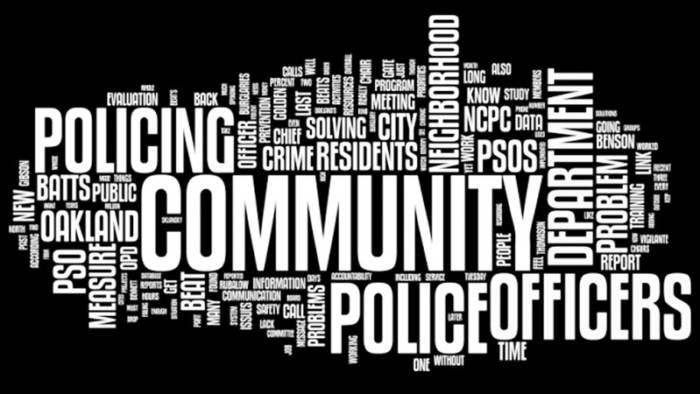By Brenton Smith
Within the last 30 years, countries worldwide have seen an increase in other government agencies, as well as community members, the media and private businesses forming collaborative partnerships between themselves and the law enforcement agencies.
Community policing is the name given to collaborative partnerships between the police and the public that aim to develop solutions to problems within their communities and also increase trust in the police.
According to Farrell (1994), community policing is defined as an organisation-wide philosophy and management approach that promotes community policing partnership, proactive problem-solving and community engagement to address the causes of crime, fear of crime and other community issues.
The philosophy of community policing focuses on what has to be done, how it is done and whether modern management practices technique and technology increase efficiency and effectiveness. This philosophy is based on the concept that police officers and private citizens working together in creative ways can help solve contemporary community problems related to crime, social and physical disorder and neighbourhood decay.
Here in St. Vincent and the Grenadines, while some aspects of community policing — such as the Pan Against Crime initiative, Police and Coast Guard summer programmes, and the Police Youth Clubs — are practised, much more is needed in order to see a reduction in crimes, such as murders. Every police officer must understand and be willing to play his or her role in aspects of community policing. It cannot be left to the few persons who are directly responsible to see the programmes’ success. Many persons criticise the Pan Against Crime programme and even the Police Youth Clubs on the grounds that they cannot stop or have not stopped crime. While I believe that much more is needed to be done with better structures put in place, can you imagine what these hundreds of youths that are involved in these programmes might have been doing in their spare time if these programmes were not around? Let us measure the success rate of these programmes through a scientific approach by calling on the authorities to do a quantitative and qualitative study and find ways to improve them, based on the results of these studies.
Community policing is not a cheap venture by any means. It will take the government, along with the private sector, to invest heavily in such programmes. In the United States, just before 911, millions were invested in the Department of Justice in various aspects of community policing programmes and projects in an effort to help city governments reduced crime and to assist neighbourhoods in reclaiming their identity. However, these monies were diverted to Homeland Security due to the high threats of terrorism. Our youth will find the wrong things to do if they are not actively involved in programmes that are designed to make them better men and women in the future. This new dimension of community policing will take major organisational change, new thinking from the police hierarchy, teamwork and the involvement of civilians if we are to succeed in the fight against crime by way of community policing.
Effective community policing strategy will reduce neighbourhood crime, decrease citizen fear of crime and improve quality of life in the community.
Let us begin a conversation on community policing and developed strategies to restore our country to the peaceful place it used to be and give our citizens a chance to reclaim their identity.
The views expressed herein are those of the writer and do not necessarily represent the opinions or editorial position of iWitness News. Opinion pieces can be submitted to [email protected]
The opinions presented in this content belong to the author and may not necessarily reflect the perspectives or editorial stance of iWitness News. Opinion pieces can be submitted to [email protected].







Good article but what will also help tremendously is the use of technology in the fight against crime. CCTV with special number plate recognition features is a good start. These should be instituted in strategic locations around country starting with Kingstown. The use of forensics is very much need in SVG and an emphasis should be made to reintroduce the traffic lights and place these officers who are on the streets directing traffic, to aid in more proactive type policing.
Remove the officers from telecom, H.Q, Tailor shop etc and replace them with civilians, who will then be sworn in as district constables. These officers should be involved in more active police work. Forming a 911 department will be a brilliant idea and naming the streets throughout the country is something that is so desperately needed for proper identification in terms of quick response to incidents of crime. Educating the public about community policing through the print and talk media should be done as much as possible.
More vehicles to patrol the communities and to respond to reports within a targeted time period. Setting up an anonymous reward initiative to get the guns off the street campaign with funding from the corporate sector of SVGg is the way to go as well.
There should be an aim to reduce 40 murders per year to 0 in 2018. SVG would not be able to survive a competitive tourism industry in the caribbean, if crimes especially murder, robbery and home invasions are not drastically reduced in the near fiture.